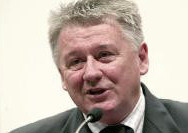- Србија
Упознајте Србију
- Грађани
Образовање
Култура и наука
Здравство
- Посао
Запошљавање
Привредна клима
- Медији
- Влада
Влада Републике Србије
- Контакт
Будимо у контакту
Контакт форма
Назад
Будимоу контакту
Било да имате питање, коментар, сугестију или било какав проблем који је у оквиру надлежности Владе, пошаљите нам своју поруку и потрудићемо се да вам одговоримо у најкраћем року. Уколико ваш проблем излази из оквира наших овлашћења, проследићемо поруку надлежној институцији.
П:
О:
Читај ми
Представљен пројекат аутопута Београд - јужни Јадран
Чачак,
18. јун 2005.
Министар за капиталне инвестиције у Влади Републике Србије Велимир Илић изјавио је данас у Чачку да је пројекат за изградњу аутопута Београд - јужни Јадран у завршној фази.
Илић је на презентацији пројекта, одржаној у Институту за воћарство у Чачку, рекао да Влада треба да донесе концесиони акт и за то се чека сагласност још само Министарства финансија. Након тога, биће расписан тендер за изградњу аутопута.
Технички директор београдског Института за путеве "ЦИП" Милосав Анђелковић је истакао да је урађен генерални пројекат за деоницу аутопута од Београда до Пожеге и додао да за даљу трасу постоје две студије, од којих ће једна бити пројектована.
Укупна дужина трасе аутопута је 440 километара. Од тога дужина пута од Београда до Пожеге је 148 километара и од Пожеге до границе са Црном Гором још 126 километара, указао је Анђелковић. Дужина аутопута кроз Србију је 274 километра, а на територији Црне Горе 166 километара, додао је он.
Предвиђено је да аутопут има четири саобраћајне траке, 8 километара мостова и три километра тунела, а предвиђена је брзина од 80 до 120 километара на час, са просечном брзином од 100 километара на час.
Илић је нагласио да је вредност инвестиције изградње деонице аутопута од Београда до Пожеге око 800 милиона евра и изразио очекивање да ће после расписаног тендера за концесије изградња почети крајем ове године.
Презентацији овог пројекта, поред представника Министарства за капиталне инвестиције и "ЦИП-а", присуствовали су и представници Републичке дирекције за путеве, Републичког геодетског завода, као и представници 15 општина кроз које пролази аутопут.
Технички директор београдског Института за путеве "ЦИП" Милосав Анђелковић је истакао да је урађен генерални пројекат за деоницу аутопута од Београда до Пожеге и додао да за даљу трасу постоје две студије, од којих ће једна бити пројектована.
Укупна дужина трасе аутопута је 440 километара. Од тога дужина пута од Београда до Пожеге је 148 километара и од Пожеге до границе са Црном Гором још 126 километара, указао је Анђелковић. Дужина аутопута кроз Србију је 274 километра, а на територији Црне Горе 166 километара, додао је он.
Предвиђено је да аутопут има четири саобраћајне траке, 8 километара мостова и три километра тунела, а предвиђена је брзина од 80 до 120 километара на час, са просечном брзином од 100 километара на час.
Илић је нагласио да је вредност инвестиције изградње деонице аутопута од Београда до Пожеге око 800 милиона евра и изразио очекивање да ће после расписаног тендера за концесије изградња почети крајем ове године.
Презентацији овог пројекта, поред представника Министарства за капиталне инвестиције и "ЦИП-а", присуствовали су и представници Републичке дирекције за путеве, Републичког геодетског завода, као и представници 15 општина кроз које пролази аутопут.
-
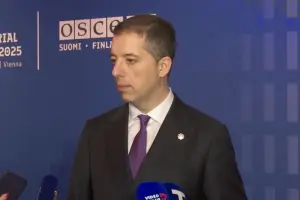 Београд/Беч, 4. децембар 2025.
Београд/Беч, 4. децембар 2025.Србија подржава ОЕБС као инструмент мира у Европи
-
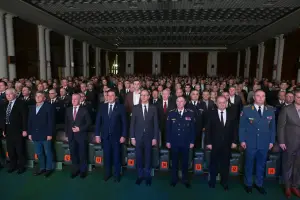 Београд, 4. децембар 2025.
Београд, 4. децембар 2025.Одржана свечана академија поводом Дана војних ветерана
-
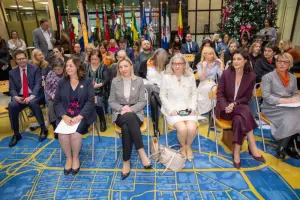 Београд, 4. децембар 2025.
Београд, 4. децембар 2025.Стварање безбеднијег дигиталног окружења за жене и девојчице
-
 Београд, 4. децембар 2025.
Београд, 4. децембар 2025.Честитка министра одбране поводом Дана војних ветерана
-
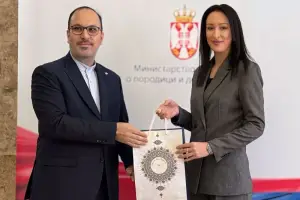 Београд, 4. децембар 2025.
Београд, 4. децембар 2025.Јачање сарадње са Ираном у области породичне и демографске...
-
 Београд, 4. децембар 2025.
Београд, 4. децембар 2025.Наставак стручне подршке ОЕБС-а правосудним институцијама у...
-
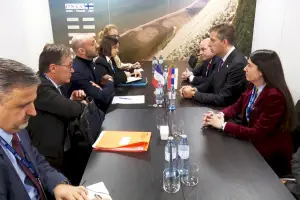 Бeоград/Беч, 4. децембар 2025.
Бeоград/Беч, 4. децембар 2025.Билатерални састанци Ђурића на маргинама Министарског савета...
-
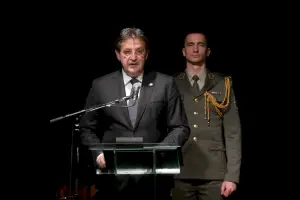 Врање, 4. децембар 2025.
Врање, 4. децембар 2025.Гашић присуствовао обележавању јубилеја РТВ Врање
-
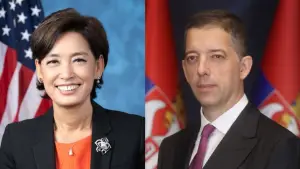 Бeоград/Вашингтон, 3. децембар 2025.
Бeоград/Вашингтон, 3. децембар 2025.Српска дијаспора у САД драгоцени мост сарадње између две земље
-
 Врање, 3. децембар 2025.
Врање, 3. децембар 2025.Компанија „Јумкоˮ важан партнер система одбране

